EUROPE
Czech Republic

Miroslav Singer
Grade: B
Miroslav Singer had just been appointed governor when we published our last Central Banker Report Cards, but he hasn’t wasted any time in giving his assessment on how the euro crisis could be resolved, and he has performed with the surety most expected. In a speech he gave in London in June, one got a certain measure of the man when he bluntly spoke about the eurozone’s ability to survive a Greek default. Singer said: “Another myth is that the eurozone cannot survive a Greek default. Why not? Is it insolvent?” For the past few months, the bank kept the benchmark interest rate at 0.75%, despite some members having voted to increase it by a quarter percentage point at a meeting on August 4, 2011. As a demonstration of his calm and steady approach, Singer kept rates on hold, as he believes “monetary-policy-relevant inflation” will remain within the bank’s target range, although he did presage that rates could rise gradually from late 2011 to early 2012. However, like a number of central bankers, he is reluctant to raise rates too soon while the economic growth outlook remains uncertain.
European Union
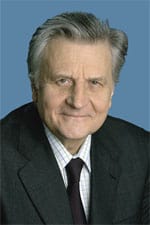
Jean-Claude Trichet
Grade: B-
With Jean-Claude Trichet’s tenure as European Central Bank president coming to an end in October, the last few months of his presidency have been dominated by the inability of the ECB and the European Union to adequately resolve the sovereign debt crisis. Trichet is more likely to be remembered for failing to put a lid on the crisis rather than for some of his more impressive gains, such as ensuring the European Financial Stability Facility was able to buy bonds on the open market. Despite various bailouts and buying of European sovereign bonds, the crisis is far from over. Given that the ECB started out with a no-bailout policy, Trichet’s critics say the legacy he is likely to leave his successor, Italian central bank governor Mario Draghi, is a central bank that eurozone countries believe will ride to their rescue whenever they are in trouble. In fact the last 12 months has seen Trichet change his mind on a range of issues, such as granting special treatment to Greece, the issue of a country or countries within the eurozone defaulting and bond purchases by the bank. Although some say he is in uncharted territory, his indecision has not helped matters. In early August the ECB decided to leave its benchmark interest rate unchanged at 1.50%, having increased it by 25 basis points back in early July. It also announced six months of additional liquidity measures in an effort to ease some of the “renewed tensions” in eurozone financial markets, but its announcement initially failed to quell investors’ concerns and was criticized for being too limited. This prompted another round of bond buying by the ECB but its approach to the sovereign crisis has been more reactive than proactive.
Hungary
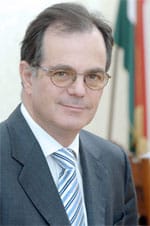
András Simor
Grade: C
The past 12 months have seen the governor of Hungary’s central bank make some difficult decisions. Despite recognizing the country’s still “fragile” growth prospects, András Simor stated that in order to achieve his objective of a “predictable, stable economic path,” some monetary policy tightening was needed. The bank’s monetary council decided to raise interest rates at its November 2010 meeting, and did so again in December. In the past six months, the tightening has eased off, with the monetary council leaving its base rate of 6.00% unchanged. At the moment, Simor is sitting tight when it comes to interest rates, although some may argue he could do more to stimulate economic growth. However, it is clear that inflation targeting is his main priority. The monetary council has indicated that rates remain a tool for it to use depending on whether the eurozone crisis is successfully resolved or not and whether domestic inflation conditions worsen. Simor has demonstrated the ability to make difficult decisions when needed, but it is an open question whether his tightening of monetary policy and targeting of inflation has paid off. He will have to be patient, as Hungary’s economy is not out of the woods yet, with domestic demand still below the levels he would like to see. The central bank indicated in its late-June monetary policy meeting that it expects inflation to exceed 3% this year, falling back to its target rate by the end of 2012.
Norway

Øystein Olsen
Grade: Too early to say
In January this year, Øystein Olsen took over from former central bank governor, Svein Gjedrem, whose term expired at the end of 2010. Gjedrem may be a difficult act to follow, given that other central bankers credit him with establishing the inflation-targeting monetary policy of the Norges Bank, which is a model the rest of the world has followed. At the bank’s executive board meetings in late June and early August, it kept the policy rate at 2.25%, given the Norwegian economy’s good growth and relatively low inflation. In June, Olsen indicated that rates were projected to increase gradually in the second half of the year as internal and external inflationary pressures fed through. Inflation targeting appears still to be uppermost in the mind of Norges Bank and its new governor.
Poland
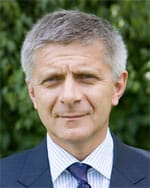
Marek Belka
Grade: B
When Marek Belka was appointed governor of Poland’s central bank in June 2010, media outlets reported that he was considered to be “a safe pair of hands,” given that as former European director of the IMF in the wake of the 2008 global economic crisis, he had led efforts to get the Baltics and other countries in Central and Eastern Europe back on track. He also appears to be behind decisions to make the monetary policy council’s decisions more transparent by publishing voting results on the bank’s website. Since the beginning of 2011, Belka’s tenure as governor has been dominated by a tightening of monetary policy, with a succession of rate rises of 25 basis points in response to “heightened” inflationary pressures, particularly in commodity prices. Inflation targeting appears to be uppermost in Belka’s mind. Poland is one of the few CEE countries whose economies have continued to grow strongly in the wake of the 2008 crisis, and Belka is eager to ensure that its growth does not intensify domestic inflationary pressures.
Russia
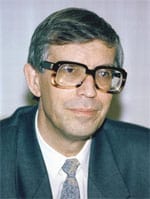
Sergei Ignatiev
Grade: B
When inflationary pressures started to emerge as a threat to the Russian economy at the beginning of the year, central bank governor Sergei Ignatiev wasted no time in raising rates in February by 25 basis points to 8%, the first increase in rates since the onset of the 2008 financial crisis. Another 25 basis point increase in the overnight rate was instituted in May, making it abundantly clear that Ignatiev is serious about getting inflation down, even if it means the ruble appreciates. With inflation in excess of 9%, one can understand his concerns, and it seems Ignatiev’s swift response is starting to pay dividends, albeit slowly. In August the bank kept interest rates unchanged, citing indications that “the pace of inflation continued to decrease.” Ignatiev will still need to tread carefully, since despite the improvement in some economic indicators, the growth recovery remains fragile. The central bank has indicated it wants to reduce the rate of inflation from almost 10% to 7% this year, and Ignatiev’s razor-sharp focus on inflation targeting sometimes puts him at odds with the country’s exporters, as indicated by his comments when an export ban on Russian grain was lifted back in May. Despite the fact that grain exporters welcomed the lifting of the ban, according to newspaper reports, Ignatiev described it as the “single biggest threat” to the government’s inflation targeting.
Sweden

Stefan Ingves
Grade: B+
Unlike some of his other European counterparts, Stefan Ingves enjoys the prospect of a growing economy (growth of more than 4% is expected in 2011) and declining unemployment. That perhaps gives him a little more room to maneuver when it comes to implementing a more accommodative monetary policy than some of his peers, although it is clear that Ingves, like most central bankers, has his eye on inflation targeting. At its July monetary policy meeting, the bank’s executive board voted to increase the repurchase rate by a quarter point to 2%, and it has not ruled out further increases, dependent on “long-term inflation expectations.” However, the bank is accommodating when it comes to monetary policy tightening, indicating that any increases in the repo rate are likely to be “slower” in the future if, for example, inflation were lower than expected as a result of a rising krona. Minutes from the July meeting saw Ingves highlight the “risk of increasing inflation impulses from abroad.” He has also been less inclined than some of his peers to engage in euro bashing, instead pointing out that Greece aside, there are growth success stories within Northern Europe, and that it was these countries that were more important to Sweden.
Switzerland
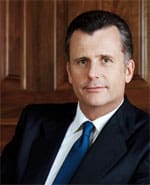
Philipp Hildebrand
Grade: B-
In June, Philipp Hildebrand gave an indication of what was likely to come when he said the bank was concerned about “exchange rate developments,” with the Swiss franc appreciating rapidly against the dollar. So it should have come as no surprise when the bank announced in early August that it would cut interest rates to stem appreciation of the Swiss franc. The sudden cut in interest rates caused a sharp sell-off in the franc, which declined by more than 2%. However, the impact appeared to be short-lived, with the franc later continuing its rise against the dollar. The central bank did not rule out further measures if the franc continues to appreciate, and in the second week in August, Hildebrand intervened again, announcing that it would “increase the supply of liquidity to the Swiss franc money market” and engage in foreign exchange swaps. Hildebrand has demonstrated he is not afraid to intervene when needed to reduce the negative impacts of a rising Swiss franc on the local economy and inflation. However, he has come under criticism from the Swiss National Bank’s shareholders, as his previous interventions in 2010 in the currency markets to devalue a strong franc led to paper losses for the bank. And, no matter what he does, the franc continues to appreciate, a situation that is not helped by the ongoing sovereign debt crisis, with the franc being viewed by investors as a safe haven. Hildebrand is running out of options, which stirred speculation in August that the franc might become pegged to the euro.
Turkey
Erdem Baçi
Grade: Too early to say
With his predecessor, Durmus Yilmaz, credited with helping Turkey sidestep the global economic crisis through bank liquidity measures and adept handling of monetary policy, Erdem Baçi, the new governor of Turkey’s central bank, has a difficult act to follow. For the last few months of his tenure, Yilmaz was focused not only on keeping inflation within the central bank’s “medium-term target” of 5% but also on reducing the adverse impact of the crisis on economic growth and financial stability. He was largely successful in achieving that: Turkey registered GDP growth of almost 9% in 2010, and its inflation fell to 3.99% in March 2011. The problem Baçi now faces is ensuring that the economy does not overheat and that a close eye is kept on the quality of bank lending activity. Baçi is expected to continue the bank’s unorthodox monetary policy, which uses higher reserve requirements rather than raising rates. In a presentation he gave in April, Baçi reported the bank was able to reduce short-term capital inflows and the acceleration of credit growth by raising reserve ratios and using different reserve requirements for loans with different maturities. Observers remain skeptical about the overall success of limiting credit growth by raising bank reserve requirements, and some banks are complaining about the impact it has on profitability. Baçi may need another trick up his sleeve.
United Kingdom

Mervyn King
Grade: B
In the past year, Bank of England governor Mervyn King has been outspoken on a number of issues regarding the UK economy. For some perhaps he has been a little too outspoken when it comes to fiscal matters, putting pressure on former Labour government chancellor Alistair Darling to get the public finances under control and then later supporting the unpopular spending cuts introduced by the new coalition government to reduce the deficit. Although his outspokenness on government and policy matters may stand out, he has remained relatively steadfast when it comes to monetary policy, keeping the base rate stubbornly low at 0.5% despite rising inflationary pressures. In early August the Bank announced that inflation was likely to reach 5% by the end of this year—up from 4.4% as of July. However King was adamant that hiking interest rates would do nothing, as most of those inflationary pressures were external. Unlike some of his peers, King’s main preoccupation right now is not inflation targeting. Rather, it is getting the economy growing again.
Despite his earlier support for the coalition government’s spending cuts, surely King must now be questioning whether they haven’t gone too far, with the Bank of England forced to downgrade its UK economic growth forecast again in August. Once again, however, King attributed that to weak external factors.
|
|
||




